We search and download unpopular and old files on the Internet
Mostly media files. In all seriousness, no joke.

Alas, a common situation in trying to download something
')
That happens. Recently, unfortunately, it happens more often: right holders and law enforcement agencies seriously took up file sharing; last year, KickassTorrents, BlackCat Games, what.cd, btdigg, torrentz.eu, EX.ua, fs.to, torrents.net.ua, and a bunch of other sites closed or were closed. And if the search for fresh rips of movies, TV shows, music, cartoons still doesn’t pose a big problem, despite the frequent removal of content owners from search engines, torrent trackers and file sharing sites, search and download the original (DVD or Blu-Ray) movies and TV shows or just 7-year-old TV rips in non-English and non-Russian is not such an easy task.
In the case of video, it sometimes happens that the picture is duplicated and broadcast on television in some country, but not on the discs. Kappers upload TV-rips to file-sharing networks or BitTorrent, then DVDs are released in another country, without a corresponding audio track, for example, French, and people have to either download DVDRip with good video quality without a French track, or TV-rip with it. Time passes, the TV-rip is distributed by fewer and fewer people, it is removed from file hosting services due to inactivity, and that’s it - the French release is getting more difficult to download.
The problem could be solved by combining the audio track from the TV rip with the available video from the DVD, which is not always as easy as it sounds. Nobody took care of it and the TV version died.
• Content Difference TV and DVD version
For example, the animated series Daria lost almost all of the music that was in the TV version due to legal issues with relicensing. For a long time, people who wanted to watch this series faced a choice: either a full-fledged TV version with music and poor video quality, or a DVD version with good quality, but without music.
• Regional differences
Fair for both video and music. The WITCH animated series was released with 4 different openings, only one of which was on DVD.
Often, music albums released for the Japanese market contain bonus tracks that are not found in other publications.
As you already understood, the reasons may be many. Where to look for unpopular and old files?
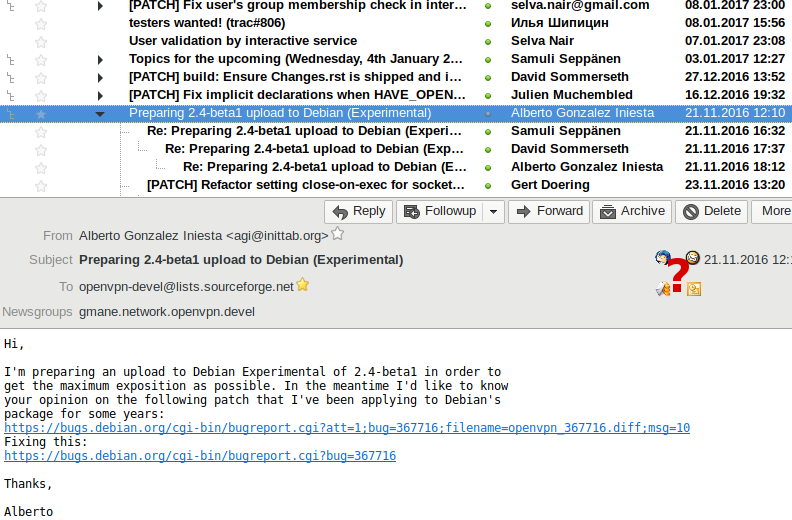
With the increase in bandwidth, the improvement of modems and their protocols, by the nineties, the network was already used to transfer binary files: Varese, music, video files. This was done in much the same way as in Email: the file is divided into small parts (volumes), encoded with printable characters in 7-bit encoding using Base64 or uuencode, and sent to the newsgroup. 7-bit encoding adds about 30% of the file transfer overhead. The specification allows you to use most of the characters from the ASCII table, so in 2001, the file transfer algorithm yEnc appeared, increasing the file by only 1-2%, escaping only line breaks, NULL bytes, and the equals symbol (=). It is used to this day.
Parchive is used to monitor the integrity and restore damaged or missing data.
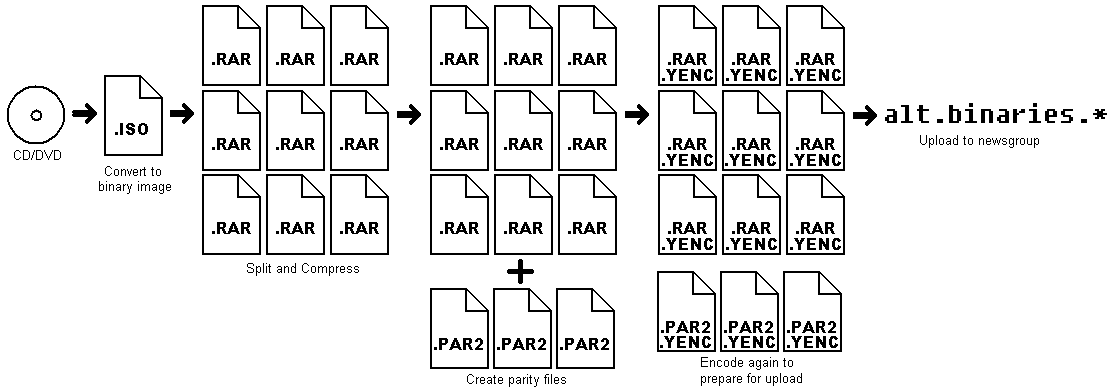
Until 2008, the largest Usenet providers stored binary files for about 100–150 days from the time they were loaded (the so-called retention time, file retention period). Since 2008, the largest providers have ceased to delete anything at all, and currently, you can easily download files eight years ago, and smaller providers put retention time at 1000+ days, which is also a lot. By this time, textual communication in Usenet had faded away and the network was used primarily for storing and transferring files.
Starting sometime in mid-2011, the right holders began to monitor the network, which is why Usenet providers had to delete files, which greatly affected the integrity of releases. Some providers have made automated file deletion systems so that copyright holders can delete downloads on their own. In order to prevent or at least slow down file detection by copyright holders, enthusiasts start uploading files with obfuscated names, in archives under passwords, and add them to the catalogs of release indexing systems, which are usually accessed either for money or by invitation . Ordinary ways to neither find nor download such releases will fail.
In modern Russia, almost no one knows about Usenet, although it was from him that Runet was born under the UUCP protocol that was one of two working channels for communication with the West during the 1991 putsch (the second one is FIDO). Now Usenet is most popular in countries whose laws allow users to be fined for downloading or distributing copyrighted content, for example, in Germany. Unlike BitTorrent, it’s impossible to find out the IP addresses of Usenet users of a third party.
The largest providers are Altopia , Giganews , Eweka , NewsHosting , Astraweb .
Now you need to somehow get the nzb-file with meta-information, it is something like a .torrent file. If you do not have it, you need to use the search engine-indexer.
Here are some of them:
Free indexers requiring registration are more suitable for fresher files. They are well cataloged, releases have not only the name, but also a description with a picture.
The last two are especially recommended; you can find many obfuscated releases in them.
There are also targeted sites. For example, the index anime anizb and music albumsindex .
Go to nzbking.com , perform a search on "the.fp.2011".

We see in the index a file for which only one part of the 3867 is available. Such a file cannot be downloaded, therefore the indexer displays this parameter in red.

Password-protected files are usually just fakes.

On the second page there is a DVDRip, with an adequate size, in the archive without a password - a good sign.

On the third page we find the BDRip and several DVDRip similar to the real ones (judging by the file size and the download date).
We select the files we want to download, click the “Download NZB” button, download the .nzb file and import it into NZBGet or SABnzbd, having previously entered the data of your Usenet account in the program settings. The download starts with the speed of my provider's channel.

At the end of the download, NZBGet will automatically unpack the archives and delete them. The file size of 6.74 GB, downloaded 4.5 years ago, downloaded in 15 minutes!
Today, there are both separate channels and entire servers dedicated to file sharing through XDCC. Almost any serious anime release group, which may not even have a website, has its own bot, from which you can download all the releases of the group, regardless of their age. The popularity of XDCC is due to the functionality of the scripts, the ease of their configuration and administration: uploading a release is enough to upload a file to the server with a bot in some way, for example via FTP, and the bot will add it to the index, notify users on the channel about the appearance of a new file, automatically send it users who subscribe to updates of this bot (for example, if this is a new episode of the series).
In special IRC networks they distribute warez, fresh and not so much movies, music, games, books. XDCC is not endowed with the attention of copyright holders, so bots can find a lot of things that are difficult to find in other places.
General content indexers:
Anime Indexers:
Varese :
Films :
Cartoons and anime :
All versions of bots accept the
Let's try to download “How Music Got Free” (“How music became free” in Russian) - a wonderful book about the history of the music industry, the technology of sharing music and a man who almost single-handedly pulled 2000 albums and put them on the net.

The bot sends the search result in the form of a ZIP archive with a text file:

We send the bot request to download the file:

... and accept it!

Of course, it is not necessary to search directly on the channel. If you find the file you need through the indexer, you can immediately request it from the bot with the command that the site generates for you.
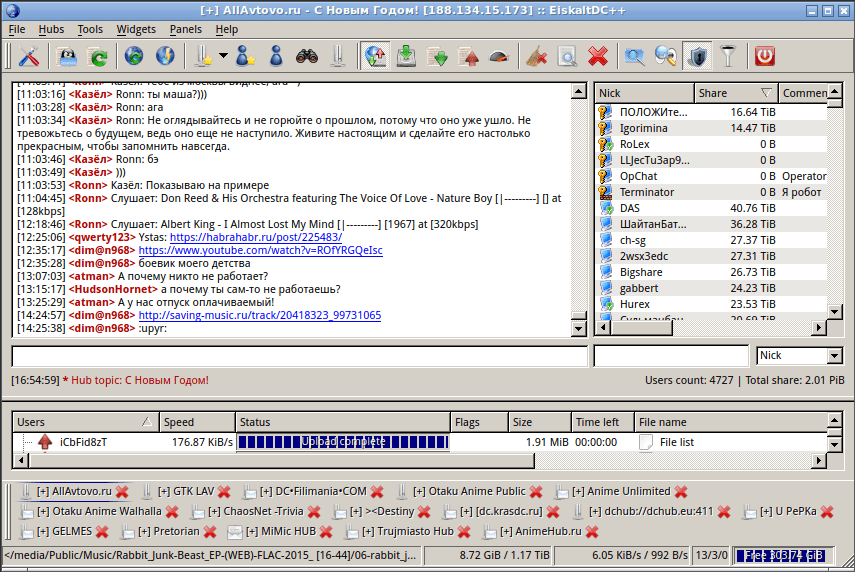
Due to the fact that the user simply specifies the path to the files to which he wants to open public access, in DC ++ you can find an eerie, obscure old stuff, which, according to the user with this file, certainly did not give up, but he didn’t care Share it, just in case.

3 people hand out an 11-year-old video lesson that no sane person wants to watch, believe me.
I strongly recommend that you enable “active” mode, forward ports, enter your external IP address in the program settings and make sure that you can connect from the outside, otherwise, in “passive” mode you will have restrictions on the number of search results, you will not be able to download files from other users in the "passive" mode.
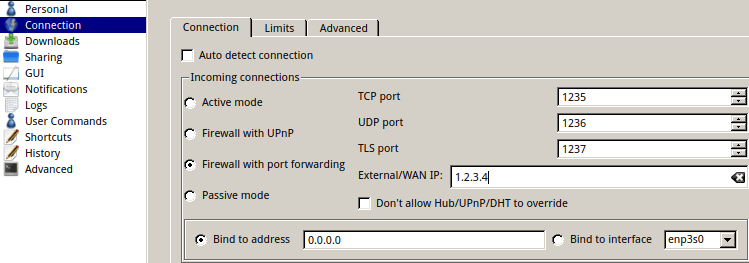
Searching and downloading files is intuitive: enter a name, optionally choose a content type and filter by size, click the search button, double-click on the result, the file starts to download. You can also view all user files (and, for example, download the folder with the entire file found) by right-clicking on a specific result and selecting the appropriate menu item.
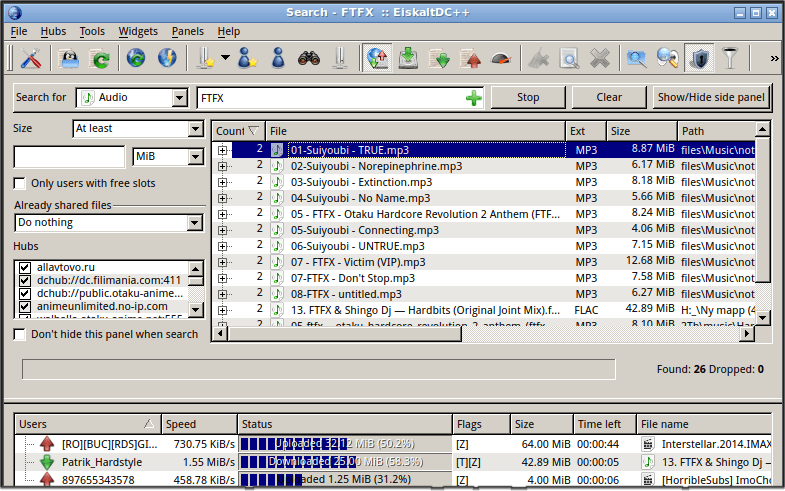
If the file you need was not found, it makes sense to repeat the search periodically. Some people launch a DC client only when they need to download something, and you need to take a moment to find the file from such users.
Due to the limitations of the NMDC protocol, a simultaneous search for several files is difficult, the results of one search query can be mixed up and displayed in adjacent search windows, so it is best not to search for several files at the same time. Hubs operating under the ADC protocol do not have such restrictions, but there are not many such hubs either (their URI starts with
As far as I know, there is only one full-featured DC ++ indexer - spacelib.dlinkddns.com (and its second address is dcpoisk.no-ip.org ). The search is based on the Sphinx engine and takes into account the morphology (including the Russian language). The search engine generates magnet links for search results that can be put on download in the client.
Sometimes he is not available for a long time, for example, the last time he did not work for two months in a row.
eDonkey2000 survived. This was facilitated by the protocol of the fully decentralized exchange Kad, which was introduced to third-party clients shortly before the closure of Razorback 2 and the main server of the original program, which is inferior in functionality and speed to alternative implementations.
In ed2k, you can find approximately the same thing as in DC ++ - old files, TV shows in different languages, various music, games, tools, old books on programming, mathematics, and biology. Of course, new items are also available. Although the protocol also supports chats and viewing all user files in the public domain, these functions are disabled by default, and most likely you will not be able to communicate with people you are interested in through the program.
The process of searching and downloading files is very similar to that in DC ++ - we enter a search query, we get search results from users who are online, we click on the files to start downloading.
The file will appear in the results even if users are online, there are only parts of it, but not the entire file.
Let's try to find a little-known 2009 documentary We Live In Public - a picture telling about the events of the 90s, which partially predicted the modern Internet. Part of the time in the film is devoted to the pseudo.com website, an audio and video broadcasting service founded in 1993.
Enter the search phrase, we get the results:
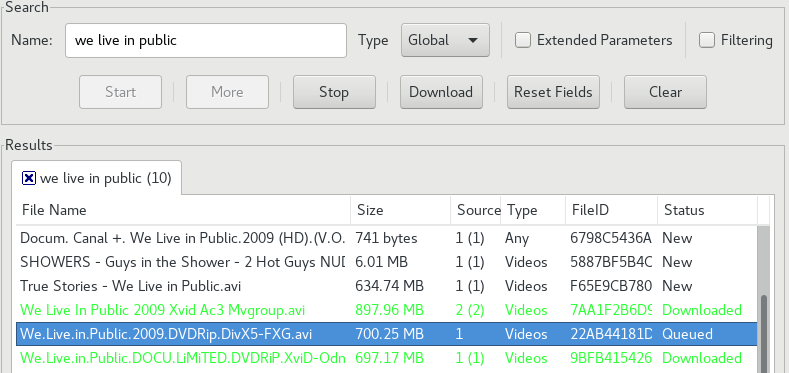
Click, download starts:

File uploads can take weeks and months. For some reason, many netizens have a disgusting internet connection, and they even appear once a week for a couple of hours, or even less.
There is an official cross-platform proprietary client SoulseekQt and two developing unofficial ones: Nicotine + and Museek + .
Previously, the most popular indexer was the now idle btdigg , which was replaced, with some delay, by the following sites:
Unfortunately, these services do not last long: two of my favorites, fastbot and BTKitty.red, did not open at the time of this writing.
FTP server indexers rarely find the files you need, but it's worth a try:
Search engines for popular file hosting services also exist, but are not always effective:
Until very recently, a large amount of content could be found at ex.ua, but alas.
Stage releases very often contain abbreviated or intentionally corrupted archive names that cannot be found by a normal search by file name. To find out the real name, you need to look for it in special indexers for scene releases: layer13.net , pre.corrupt-net.org and predb.me .
Let's try to find out the stage name of the archives with the release of We Live In Public from PUZZLE on Layer13:
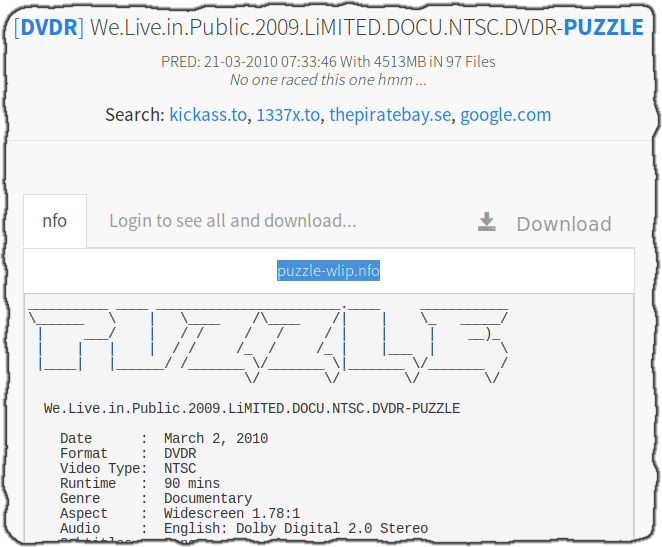
The NFO file is called “puzzle-wlip.nfo”. The names of the archives are almost always, in 99% of cases they coincide with the name of the NFO, therefore we will try to look for this name in the Usenet indexer:

Hurray, now we can download a DVD movie!
Regular search engines like Google will not always help you. First, Google follows the letter of the law and removes (hides) the results from the sites reported to owners by the DMCA , secondly, searching for content with the name of special characters is difficult: it is difficult to find something about WITCH , you are constantly slipping information About Witch , The Witch or Blair Witch . I prefer to use DuckDuckGo , Bing, and SearX's metasearch for searching — through them you can find materials that are not available on Google.
If you are interested in a release in a specific language, it is more appropriate to find out the localized name and search for it. You can get this information on Wikipedia, IMDb and other similar sites.
For anime there is anidb , which stores information about releases of groups in different languages. The group card, as a rule, contains a link to the website or the IRC channel, where you can chat with its members and download files via XDCC.

In addition to the source, video resolution, audio track languages and subtitles, anidb has a TTH hash for DC ++ and an ed2k link for each file.
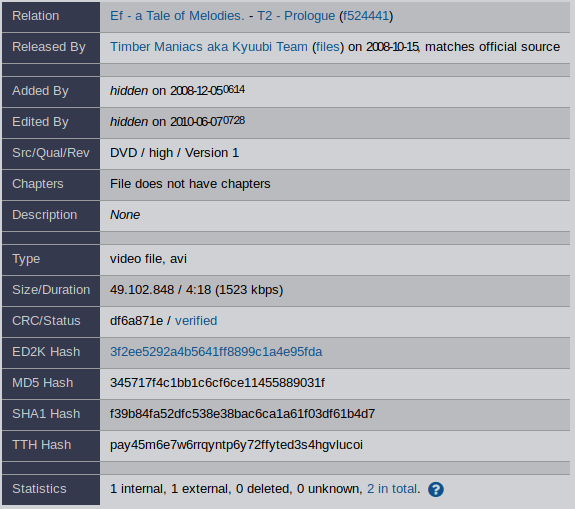
Introduction
It happens that it happens that you want to download an album of 2007 by the artist, who besides you are known to 3.5 people, some Spanish ska-punk or low-popular speedcore of European origin. Find BitTorrent distribution, put on download, quickly download 14.7%, and ... everything. It takes a day, a week, a month, and the percentage of downloaded does not increase. You search for this album in a search engine, stumble upon forums showing links only after registration and 5 written messages, register, flood dead themes, you open links to file sharing services like rapidshare and megaupload that have already died for a hundred years.
Alas, a common situation in trying to download something
')
That happens. Recently, unfortunately, it happens more often: right holders and law enforcement agencies seriously took up file sharing; last year, KickassTorrents, BlackCat Games, what.cd, btdigg, torrentz.eu, EX.ua, fs.to, torrents.net.ua, and a bunch of other sites closed or were closed. And if the search for fresh rips of movies, TV shows, music, cartoons still doesn’t pose a big problem, despite the frequent removal of content owners from search engines, torrent trackers and file sharing sites, search and download the original (DVD or Blu-Ray) movies and TV shows or just 7-year-old TV rips in non-English and non-Russian is not such an easy task.
Why do you need it?
• Lack of some releases on discsIn the case of video, it sometimes happens that the picture is duplicated and broadcast on television in some country, but not on the discs. Kappers upload TV-rips to file-sharing networks or BitTorrent, then DVDs are released in another country, without a corresponding audio track, for example, French, and people have to either download DVDRip with good video quality without a French track, or TV-rip with it. Time passes, the TV-rip is distributed by fewer and fewer people, it is removed from file hosting services due to inactivity, and that’s it - the French release is getting more difficult to download.
The problem could be solved by combining the audio track from the TV rip with the available video from the DVD, which is not always as easy as it sounds. Nobody took care of it and the TV version died.
• Content Difference TV and DVD version
For example, the animated series Daria lost almost all of the music that was in the TV version due to legal issues with relicensing. For a long time, people who wanted to watch this series faced a choice: either a full-fledged TV version with music and poor video quality, or a DVD version with good quality, but without music.
• Regional differences
Fair for both video and music. The WITCH animated series was released with 4 different openings, only one of which was on DVD.
Often, music albums released for the Japanese market contain bonus tracks that are not found in other publications.
As you already understood, the reasons may be many. Where to look for unpopular and old files?
Usenet
Usenet is a distributed network of servers that synchronize information with each other. The Usenet structure is reminiscent of something between forums and e-mail: in “newsgroups” (the so-called thematic categories in Usenet), messages have a tree structure, users can subscribe to specific groups, read and write to them. As in Email, messages have a subject (subject), which allows you to navigate the content of discussions. Now used primarily for file sharing.Usenet history
The network, which appeared in 1979, in the pre-Internet era, used direct modem connections to transmit information via UUCP and was a tool of primarily text communication. At one time, Usenet competed with BBS, there were special gateways to and from Fidonet. With the advent of the Internet, Usenet messages began to be transmitted via TCP / IP using the NNTP protocol, which remains relatively used outside of Usenet (for example, you can read a huge number of public mailing lists via gmane and RSS feeds via gwene , and, unlike mailing lists , you can always see the whole story, not just messages from the time of your subscription).
With the increase in bandwidth, the improvement of modems and their protocols, by the nineties, the network was already used to transfer binary files: Varese, music, video files. This was done in much the same way as in Email: the file is divided into small parts (volumes), encoded with printable characters in 7-bit encoding using Base64 or uuencode, and sent to the newsgroup. 7-bit encoding adds about 30% of the file transfer overhead. The specification allows you to use most of the characters from the ASCII table, so in 2001, the file transfer algorithm yEnc appeared, increasing the file by only 1-2%, escaping only line breaks, NULL bytes, and the equals symbol (=). It is used to this day.
Parchive is used to monitor the integrity and restore damaged or missing data.

Until 2008, the largest Usenet providers stored binary files for about 100–150 days from the time they were loaded (the so-called retention time, file retention period). Since 2008, the largest providers have ceased to delete anything at all, and currently, you can easily download files eight years ago, and smaller providers put retention time at 1000+ days, which is also a lot. By this time, textual communication in Usenet had faded away and the network was used primarily for storing and transferring files.
Starting sometime in mid-2011, the right holders began to monitor the network, which is why Usenet providers had to delete files, which greatly affected the integrity of releases. Some providers have made automated file deletion systems so that copyright holders can delete downloads on their own. In order to prevent or at least slow down file detection by copyright holders, enthusiasts start uploading files with obfuscated names, in archives under passwords, and add them to the catalogs of release indexing systems, which are usually accessed either for money or by invitation . Ordinary ways to neither find nor download such releases will fail.
In modern Russia, almost no one knows about Usenet, although it was from him that Runet was born under the UUCP protocol that was one of two working channels for communication with the West during the 1991 putsch (the second one is FIDO). Now Usenet is most popular in countries whose laws allow users to be fined for downloading or distributing copyrighted content, for example, in Germany. Unlike BitTorrent, it’s impossible to find out the IP addresses of Usenet users of a third party.
Connect to Usenet
Fully use the network for free, most likely, will not work: either you will encounter low file storage time (10-30 days), or low speed, or get access only to text groups. We'll have to buy access from some provider or their resellers. Most providers have two types of tariffs: a monthly subscription without restrictions on the number of downloaded (unlimited) and a package of traffic with no time limit (block). If you are going to download files from the network a couple of times a month, block access will be enough for you for a long time.The largest providers are Altopia , Giganews , Eweka , NewsHosting , Astraweb .
Now you need to somehow get the nzb-file with meta-information, it is something like a .torrent file. If you do not have it, you need to use the search engine-indexer.
Indexers
Public indexers are filled up with spam with viruses and are usually looking poorly, but are nevertheless suitable for searching for obsolete files downloaded about 5 or more years ago.Here are some of them:
Free indexers requiring registration are more suitable for fresher files. They are well cataloged, releases have not only the name, but also a description with a picture.
The last two are especially recommended; you can find many obfuscated releases in them.
There are also targeted sites. For example, the index anime anizb and music albumsindex .
Download from Usenet
Let's try to download the movie The FP of 2011, a rather unknown and unpopular movie, the BDRip of which was not so easy to find in 1080p. To do this, you need to find the nzb-file and import it into the program for downloading, for example, NZBGet or SABnzbd , after installing it.Go to nzbking.com , perform a search on "the.fp.2011".

We see in the index a file for which only one part of the 3867 is available. Such a file cannot be downloaded, therefore the indexer displays this parameter in red.

Password-protected files are usually just fakes.

On the second page there is a DVDRip, with an adequate size, in the archive without a password - a good sign.

On the third page we find the BDRip and several DVDRip similar to the real ones (judging by the file size and the download date).
We select the files we want to download, click the “Download NZB” button, download the .nzb file and import it into NZBGet or SABnzbd, having previously entered the data of your Usenet account in the program settings. The download starts with the speed of my provider's channel.

At the end of the download, NZBGet will automatically unpack the archives and delete them. The file size of 6.74 GB, downloaded 4.5 years ago, downloaded in 15 minutes!
IRC / DCC / XDCC
Internet Relay Chat is a text chat protocol that is still popular with free software developers, torrent tracker administrators, animeshniki, and botnet writers because of its simplicity. Appeared in 1989, IRC has become the standard for group chat on the Internet for many years, and it begins to lose popularity only by the mid-2000s, with the advent of ICQ and Jabber. IRC has the ability to transfer files - DCC , on the basis of which in 1994 the first bot was written to automatically distribute the files available to the bot - Xabi DCC (hence the name - XDCC).Today, there are both separate channels and entire servers dedicated to file sharing through XDCC. Almost any serious anime release group, which may not even have a website, has its own bot, from which you can download all the releases of the group, regardless of their age. The popularity of XDCC is due to the functionality of the scripts, the ease of their configuration and administration: uploading a release is enough to upload a file to the server with a bot in some way, for example via FTP, and the bot will add it to the index, notify users on the channel about the appearance of a new file, automatically send it users who subscribe to updates of this bot (for example, if this is a new episode of the series).
In special IRC networks they distribute warez, fresh and not so much movies, music, games, books. XDCC is not endowed with the attention of copyright holders, so bots can find a lot of things that are difficult to find in other places.
Indexers
Many (but not all) XDCC bots are indexed by special scripts that provide a web interface for efficient file search.General content indexers:
Anime Indexers:
IRC download
You need an IRC client, almost anyone will do (the vast majority of clients support DCC). Connect to the server you are interested in from the list, go to the channel. Largest servers with books :- irc.undernet.org, channel #bookz
- irc.irchighway.net, channel #ebooks
Varese :
- irc.criten.net, channel #elitewarez
- irc.infatech.net, channel #elitewarez
- irc.scenep2p.net, channel # the.source
Films :
- irc.abjects.net, channel #moviegods
- irc.abjects.net, channel # beast-xdcc
Cartoons and anime :
- irc.rizon.net, channel #news
- irc.xertion.org, channel # cartoon-world
All versions of bots accept the
!find or @find to search for files, and then send the results by personal message. For popular requests on channels with a large number of bots, you will literally get spammed with answers, so if the channel supports the @search command, it’s better to use it - a special channel indexer will send you the results in one file via DCC.Let's try to download “How Music Got Free” (“How music became free” in Russian) - a wonderful book about the history of the music industry, the technology of sharing music and a man who almost single-handedly pulled 2000 albums and put them on the net.

The bot sends the search result in the form of a ZIP archive with a text file:

We send the bot request to download the file:

... and accept it!

Of course, it is not necessary to search directly on the channel. If you find the file you need through the indexer, you can immediately request it from the bot with the command that the site generates for you.
DC ++
Direct Connect-network is a client-server architecture, where all communications, except for the direct file exchange, occur through the server. In DC ++, you can share files and directories, search for files based on their type (video, audio, archives, documents, disk images), links to files that are independent of the file name and, of course, chat, which is why DC ++ means hubs were very popular in the local networks of Internet providers of the Russian Federation. The Siberian provider GoodLine advertised its on-net hub on street billboards, wrote software to simplify file sharing and even embedded it in its Set-top box so that customers could watch new movies right from the TV. More than 100,000 people sat on the hub - more than in any other hub in the world.
Due to the fact that the user simply specifies the path to the files to which he wants to open public access, in DC ++ you can find an eerie, obscure old stuff, which, according to the user with this file, certainly did not give up, but he didn’t care Share it, just in case.

3 people hand out an 11-year-old video lesson that no sane person wants to watch, believe me.
Download from DC ++
You need some DC client. Under Windows, I recommend FlylinkDC ++ (which, moreover, supports BitTorrent), under Linux, EiskaltDC ++ and AirDC ++ Web . Next you need to connect to the popular hubs, it is better to immediately to the top ten. There is a list of hubs in the programs themselves, but you can use a special page and copy the addresses from there.I strongly recommend that you enable “active” mode, forward ports, enter your external IP address in the program settings and make sure that you can connect from the outside, otherwise, in “passive” mode you will have restrictions on the number of search results, you will not be able to download files from other users in the "passive" mode.

Searching and downloading files is intuitive: enter a name, optionally choose a content type and filter by size, click the search button, double-click on the result, the file starts to download. You can also view all user files (and, for example, download the folder with the entire file found) by right-clicking on a specific result and selecting the appropriate menu item.

If the file you need was not found, it makes sense to repeat the search periodically. Some people launch a DC client only when they need to download something, and you need to take a moment to find the file from such users.
Due to the limitations of the NMDC protocol, a simultaneous search for several files is difficult, the results of one search query can be mixed up and displayed in adjacent search windows, so it is best not to search for several files at the same time. Hubs operating under the ADC protocol do not have such restrictions, but there are not many such hubs either (their URI starts with
adc:// , and not with dchub:// ).Indexers
Search inside the program can only find files of users located in the DC network at the time of the search, so indexers are very useful for finding and downloading files from people who rarely run the program.As far as I know, there is only one full-featured DC ++ indexer - spacelib.dlinkddns.com (and its second address is dcpoisk.no-ip.org ). The search is based on the Sphinx engine and takes into account the morphology (including the Russian language). The search engine generates magnet links for search results that can be put on download in the client.
Sometimes he is not available for a long time, for example, the last time he did not work for two months in a row.
eDonkey2000 (ed2k), Kad
ed2k is a decentralized file transfer protocol that requires a hub server to locate users and connect to them. It was protocol # 1 for transferring files among all segments of the population, until the closure of the most popular Razorback 2 server in 2006 and the growing popularity of BitTorrent.eDonkey2000 survived. This was facilitated by the protocol of the fully decentralized exchange Kad, which was introduced to third-party clients shortly before the closure of Razorback 2 and the main server of the original program, which is inferior in functionality and speed to alternative implementations.
In ed2k, you can find approximately the same thing as in DC ++ - old files, TV shows in different languages, various music, games, tools, old books on programming, mathematics, and biology. Of course, new items are also available. Although the protocol also supports chats and viewing all user files in the public domain, these functions are disabled by default, and most likely you will not be able to communicate with people you are interested in through the program.
EDonkey2000 / Kad Download
As you may have guessed, you need an ed2k client. A good choice for Linux is aMule , for Windows, probably eMule , although it has not been updated since 2011 (Update: the official community version of eMule has appeared, available for download on the official website, it is updated). I highly recommend forwarding ports to be able to download from users behind NAT (LowID).The process of searching and downloading files is very similar to that in DC ++ - we enter a search query, we get search results from users who are online, we click on the files to start downloading.
The file will appear in the results even if users are online, there are only parts of it, but not the entire file.
Let's try to find a little-known 2009 documentary We Live In Public - a picture telling about the events of the 90s, which partially predicted the modern Internet. Part of the time in the film is devoted to the pseudo.com website, an audio and video broadcasting service founded in 1993.
Enter the search phrase, we get the results:

Click, download starts:

File uploads can take weeks and months. For some reason, many netizens have a disgusting internet connection, and they even appear once a week for a couple of hours, or even less.
Soulseek
Soulseek is a centralized P2P music file sharing network, created in 2000 by one of the Napster developers. For a long time, it has been popular with listeners and authors of IDM and other electronic music, and to this day the network is developing and remains a good place to search for audio files. There are group and private chats, the ability to distribute files only to friends, a convenient music search with an indication of the bitrate and other characteristics of audio files. Some search queries are censored.There is an official cross-platform proprietary client SoulseekQt and two developing unofficial ones: Nicotine + and Museek + .
BitTorrent DHT
All popular BitTorrent clients can search for peers and share torrent files through a distributed hash table ( DHT ). This is used not only by companies that track file sharing users under an agreement with content owners, but also by indexers who try to get a torrent file from an infohash from a DHT request and save it in their database. Indexers can find anywhere not published or just a rare torrent by the name of a directory or file, as well as various duplicates of the torrent of interest to you with potential seeders.Previously, the most popular indexer was the now idle btdigg , which was replaced, with some delay, by the following sites:
- bitsnoop.com
- godht.com
- btdb.in
- digbt.org
- btdb.in
- btkitty.bid
- kikibt.net
- btdig.com (not related to the original btdigg, although the wikipedia page says the opposite)
Unfortunately, these services do not last long: two of my favorites, fastbot and BTKitty.red, did not open at the time of this writing.
File sharing and FTP servers
Almost in every region there are local file sharing services that are popular with a particular language group. For example, on uloz.to you can find a lot of Czech and Slovak content, zone-techargecharge.ws will be suitable for lovers of French, and chomikuj.pl for Poles.FTP server indexers rarely find the files you need, but it's worth a try:
Search engines for popular file hosting services also exist, but are not always effective:
Until very recently, a large amount of content could be found at ex.ua, but alas.
How to search
It is not always enough to search for files only by the name of the material, so you can miss the stage releases .Reliable group is a community of enthusiastic people united by the idea of freedom of information. It produces electronic copies of CDs or DVDs with movies, music, programs and games for computers and game consoles, following the rules of releases and competing with its competitors in the speed and quality of release of such copies (releases). The community of release groups, united by one theme (music of a certain genre, movies or warez), is called a stage .https://ru.wikipedia.org/wiki/Release_group
Stage releases very often contain abbreviated or intentionally corrupted archive names that cannot be found by a normal search by file name. To find out the real name, you need to look for it in special indexers for scene releases: layer13.net , pre.corrupt-net.org and predb.me .
Let's try to find out the stage name of the archives with the release of We Live In Public from PUZZLE on Layer13:

The NFO file is called “puzzle-wlip.nfo”. The names of the archives are almost always, in 99% of cases they coincide with the name of the NFO, therefore we will try to look for this name in the Usenet indexer:

Hurray, now we can download a DVD movie!
Regular search engines like Google will not always help you. First, Google follows the letter of the law and removes (hides) the results from the sites reported to owners by the DMCA , secondly, searching for content with the name of special characters is difficult: it is difficult to find something about WITCH , you are constantly slipping information About Witch , The Witch or Blair Witch . I prefer to use DuckDuckGo , Bing, and SearX's metasearch for searching — through them you can find materials that are not available on Google.
If you are interested in a release in a specific language, it is more appropriate to find out the localized name and search for it. You can get this information on Wikipedia, IMDb and other similar sites.
For anime there is anidb , which stores information about releases of groups in different languages. The group card, as a rule, contains a link to the website or the IRC channel, where you can chat with its members and download files via XDCC.

In addition to the source, video resolution, audio track languages and subtitles, anidb has a TTH hash for DC ++ and an ed2k link for each file.

Conclusion
Something like this, I'm looking for the files I need. Obvious things were deliberately not mentioned in the post, such as buying CDs from Amazon or Ebay and searching through popular open and closed Torrent trackers. All methods are applicable for media content from Europe and the USA, I have never had to look for, for example, Arabic and Indian content, so I can not say how effective they are.Hidden text
Also, Usenet can be used for cheap backup storage: we encrypt files, buy access to Usenet for $ 10, download files, after 4 years buy access again and download them for another $ 10. Unlike clouds, Usenet does not need to pay for file storage. But without fanaticism, they will delete it.
Source: https://habr.com/ru/post/318400/
All Articles